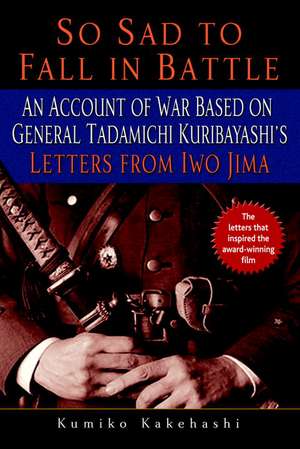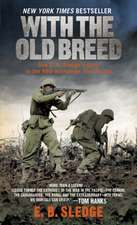So Sad to Fall in Battle: An Account of War Based on General Tadamichi Kuribayashi's Letters from Iwo Jima
Autor Kumiko Kakehashien Limba Engleză Paperback – 31 aug 2007
As author Kumiko Kakehashi demonstrates, Kuribayashi was far from the stereotypical fanatic Japanese warrior. Unique among his country’s officers, he refused to risk his men’s lives in suicidal banzai attacks, instead creating a defensive, insurgent style of combat that eventually became the Japanese standard. On Iwo Jima, he eschewed the special treatment due to him as an officer, enduring the same difficult conditions as his men, and personally walked every inch of the island to plan the positions of thousands of underground bunkers and tunnels. The very flagpole used in the renowned photograph was a pipe from a complex water collection system the general himself engineered.
Exclusive interviews with survivors reveal that as the tide turned against him, Kuribayashi displayed his true mettle: Though offered a safer post on another island, he chose to stay with his men, fighting alongside them in a final, fearless, and ultimately hopeless three-hour siege.
After thirty-six cataclysmic days on Iwo Jima, Kurbiayashi’s troops were responsible for the deaths of a third of all U.S. Marines killed during the entire four-year Pacific conflict, making him, in the end, America’s most fearedߝand respectedߝfoe. Ironically, it was Kuribayashi’ s own memories of his military training in America in the 1920s, and his admiration for this country’s rich, gregarious, and self-reliant people, that made him fear ever facing them in combatߝa feeling that some suspect prompted his superiors to send him to Iwo Jima, where he met his fate.
Along with the words of his son and daughter, which offer unique insight into the private man, Kuribayashi’s own letters cited extensively in this book paint a stirring portrait of the circumstances that shaped him. So Sad to Fall in Battle tells a fascinating, never-before-told story and introduces America, as if for the first time, to one of its most worthy adversaries.
From the Hardcover edition.
Preț: 104.48 lei
Nou
Puncte Express: 157
Preț estimativ în valută:
19.99€ • 20.66$ • 16.64£
19.99€ • 20.66$ • 16.64£
Carte disponibilă
Livrare economică 04-18 martie
Preluare comenzi: 021 569.72.76
Specificații
ISBN-13: 9780891419174
ISBN-10: 0891419179
Pagini: 211
Ilustrații: 8-PAGE INSERT
Dimensiuni: 137 x 208 x 15 mm
Greutate: 0.3 kg
Editura: Presidio Press
ISBN-10: 0891419179
Pagini: 211
Ilustrații: 8-PAGE INSERT
Dimensiuni: 137 x 208 x 15 mm
Greutate: 0.3 kg
Editura: Presidio Press
Notă biografică
Kumiko Kakehashi is a freelance writer and editor. So Sad to Fall in Battle, her first book, was published in Japan and became an instant bestseller, winning the prestigious Soichi Oya Nonfiction Prize. Kakehashi lives in Japan.
From the Hardcover edition.
From the Hardcover edition.
Extras
CHAPTER ONE
LEAVING FOR THE FRONT
Lieutenant general kuribayashi tadamichi set off for iwo Jima on June 8, 1944. His family was not informed of his destination. Whether you were a career soldier like Kuribayashi or just a conscript, in those days your family never knew to which theater of war you had been sent.
“This time maybe even my dead bones won’t be sent back home,” Kuribayashi told Yoshii, his wife. But he looked so relaxed that she did not take his remark seriously.
The final meal served at home that morning was herring wrapped in seaweed, and rice steamed with red beans. Yoshii had not boiled the red rice to celebrate her husband’s departure for the front; she made it simply because it was one of his favorite dishes.
The Kuribayashis were a family of five. In addition to Tadamichi himself, there was his forty-year-old wife, Yoshii; Tarô, the eldest of the children and a young man of nineteen; a fifteen-year-old girl called Yôko; and finally another daughter, Takako, who, at nine, was the baby of the family. They lived in Tokyo, in a detached house not far from Higashi Matsubara on the Teito Line (now the Keiô Inokashira Line) to which they had moved less than two months earlier.
In September 1941, Kuribayashi had been appointed chief of staff of the South China Expeditionary Force (Twenty-third Army) in Canton and took part in the capture of Hong Kong in December of that year. In June 1943, he was made commander of the Second Imperial Guards Home Division, which was in charge of the defense of the capital, Tokyo. But he resigned this post in April 1944 to take responsibility for a subordinate who had accidentally started a fire, and was attached to the Eastern Army Headquarters. Obliged to leave the grand mansion he had lived in as division commander, he ended up renting the house in Higashi Matsubara.
Kuribayashi’s de facto sinecure at the Eastern Army Headquarters did not last long. On May 27, he was given the command of the 109th Division. With a range of battlefield skills, the 109th was a large-scale force capable of carrying out independent operations.
The 109th had been created largely from units already in place on Chichi Jima in an effort to strengthen the defenses of the Ogasawara Islands. After his appointment as division commander, Kuribayashi had no time to relax in his new house but instead headed straight for Iwo Jima to take up his post.
His wife, Yoshii, and Takako saw him off.
Kuribayashi was shaving out on the veranda when Tarô left for school that morning. The farewell between father and son was low-key: “I’m off to school!” “All right, then.”
Nine-year-old Takako was the one who worried Kuribayashi by bursting into tears. She was a student at Matsubara Elementary School, but it just so happened that, with school finishing early that day because of a parents’ association meeting, she was back home in time to see her father off. Still, no one had the heart to scold the normally sensible and obedient girl for her moodiness.
The car came to the gate of the house to collect Kuribayashi in the early afternoon. Takako, who had no way of knowing that her father was setting off into the jaws of death, kept crying long after he had gone.
She sat down in the hall and wept for hours. The place was full of memories of her father. A stickler for punctuality, Kuriba- yashi would be ready to leave the house early every morning. He was in the habit of waiting in the hall for the adjutant who came to pick him up by car. During this short wait, he would ask his youngest daughter, herself about to head out to school, to dance for him. Takako, who was later to make her debut as a starlet of the Daiei film studio, would use the hallway step as a stage and de- light her father by singing “Ame-furi O-Tsuki-san” (“The Moon in the Rain”) while mimicking traditional Japanese dance mo- tions.
On June 25, 1944, he sent Takako this letter.
My dear Tako-chan,
How are you, Tako-chan?
In my mind’s eye, I can still see you and Mother standing by the gate to see me off on the day I left.
Since then, I’ve dreamed several times of going back home and taking a walk around the neighborhood with you and Mother. Sadly, though, it’s something I can’t really do.
You know, Tako-chan, Daddy just can’t wait for you to grow up to be a support to your mother.
Build up your strength, study hard, and do exactly what your mother tells you to do. That will really put my mind at ease.
Now I must say “Good-bye.”
Daddy at the front
Takako had been born when Kuribayashi was over forty years old. He doted on her, addressing her with the pet name of “Tako-chan,” and generally made a fuss over her. She appeared frequently in her father’s dreams while he was at the front. On November 17, 1944, he wrote to her:
Tako-chan! How are you? I’m fine!
Last night we had two air raids: one just after I’d got to sleep and another just as it was getting light. But I still managed to have a funny dream.
In my dream, you, Tako-chan, had just got out of the bath and were sniveling and whimpering. “Why are you crying?” I asked you. “Was the bathwater too hot?” Then Mother appeared. She laughed and said, “I bet it’s because you want something nice and sweet.” Then she brought out her breast and put it in your mouth. The two of you lay down, and your cheeks, Tako-chan, were all puffed out as you sucked away greedily on the breast. You just looked so very happy.
Just then out came your big sister. “I’m shocked!” she said. “I’m shocked! Honestly, Tako-chan, still suckling at your age!” Then she started poking your cheeks.
That was about all that happened, but Daddy saw all your faces so clearly that it was just like being there with you.
What do you think? A pretty funny dream, wasn’t it?
Then, on December 23, 1944, he wrote:
Tako-chan, a little while ago Daddy had another dream with you in it.
In my dream, you were very tall—about as tall as me, in fact. You also had on Daddy’s pants, but your hair was in a bob.
I was marveling at how very tall you were, when, lo and behold, who should turn up but your mother! With her there, I thought it would be nice if the two of us swung you between us the way we always did, but you were so very heavy we just couldn’t do it!
Kuribayashi probably dreamed about Takako whimpering like a baby because he could not forget how she had cried when he had left for the front.
In his dream of the following month Takako was a grown-up. She was “tall” and “very heavy” and wore her father’s hand-me-down pants, while her hair was done “in a bob”—just as when they parted at the gate. Outside of this dream, Kuribayashi was never to see Takako as an adult.
From the Hardcover edition.
LEAVING FOR THE FRONT
Lieutenant general kuribayashi tadamichi set off for iwo Jima on June 8, 1944. His family was not informed of his destination. Whether you were a career soldier like Kuribayashi or just a conscript, in those days your family never knew to which theater of war you had been sent.
“This time maybe even my dead bones won’t be sent back home,” Kuribayashi told Yoshii, his wife. But he looked so relaxed that she did not take his remark seriously.
The final meal served at home that morning was herring wrapped in seaweed, and rice steamed with red beans. Yoshii had not boiled the red rice to celebrate her husband’s departure for the front; she made it simply because it was one of his favorite dishes.
The Kuribayashis were a family of five. In addition to Tadamichi himself, there was his forty-year-old wife, Yoshii; Tarô, the eldest of the children and a young man of nineteen; a fifteen-year-old girl called Yôko; and finally another daughter, Takako, who, at nine, was the baby of the family. They lived in Tokyo, in a detached house not far from Higashi Matsubara on the Teito Line (now the Keiô Inokashira Line) to which they had moved less than two months earlier.
In September 1941, Kuribayashi had been appointed chief of staff of the South China Expeditionary Force (Twenty-third Army) in Canton and took part in the capture of Hong Kong in December of that year. In June 1943, he was made commander of the Second Imperial Guards Home Division, which was in charge of the defense of the capital, Tokyo. But he resigned this post in April 1944 to take responsibility for a subordinate who had accidentally started a fire, and was attached to the Eastern Army Headquarters. Obliged to leave the grand mansion he had lived in as division commander, he ended up renting the house in Higashi Matsubara.
Kuribayashi’s de facto sinecure at the Eastern Army Headquarters did not last long. On May 27, he was given the command of the 109th Division. With a range of battlefield skills, the 109th was a large-scale force capable of carrying out independent operations.
The 109th had been created largely from units already in place on Chichi Jima in an effort to strengthen the defenses of the Ogasawara Islands. After his appointment as division commander, Kuribayashi had no time to relax in his new house but instead headed straight for Iwo Jima to take up his post.
His wife, Yoshii, and Takako saw him off.
Kuribayashi was shaving out on the veranda when Tarô left for school that morning. The farewell between father and son was low-key: “I’m off to school!” “All right, then.”
Nine-year-old Takako was the one who worried Kuribayashi by bursting into tears. She was a student at Matsubara Elementary School, but it just so happened that, with school finishing early that day because of a parents’ association meeting, she was back home in time to see her father off. Still, no one had the heart to scold the normally sensible and obedient girl for her moodiness.
The car came to the gate of the house to collect Kuribayashi in the early afternoon. Takako, who had no way of knowing that her father was setting off into the jaws of death, kept crying long after he had gone.
She sat down in the hall and wept for hours. The place was full of memories of her father. A stickler for punctuality, Kuriba- yashi would be ready to leave the house early every morning. He was in the habit of waiting in the hall for the adjutant who came to pick him up by car. During this short wait, he would ask his youngest daughter, herself about to head out to school, to dance for him. Takako, who was later to make her debut as a starlet of the Daiei film studio, would use the hallway step as a stage and de- light her father by singing “Ame-furi O-Tsuki-san” (“The Moon in the Rain”) while mimicking traditional Japanese dance mo- tions.
On June 25, 1944, he sent Takako this letter.
My dear Tako-chan,
How are you, Tako-chan?
In my mind’s eye, I can still see you and Mother standing by the gate to see me off on the day I left.
Since then, I’ve dreamed several times of going back home and taking a walk around the neighborhood with you and Mother. Sadly, though, it’s something I can’t really do.
You know, Tako-chan, Daddy just can’t wait for you to grow up to be a support to your mother.
Build up your strength, study hard, and do exactly what your mother tells you to do. That will really put my mind at ease.
Now I must say “Good-bye.”
Daddy at the front
Takako had been born when Kuribayashi was over forty years old. He doted on her, addressing her with the pet name of “Tako-chan,” and generally made a fuss over her. She appeared frequently in her father’s dreams while he was at the front. On November 17, 1944, he wrote to her:
Tako-chan! How are you? I’m fine!
Last night we had two air raids: one just after I’d got to sleep and another just as it was getting light. But I still managed to have a funny dream.
In my dream, you, Tako-chan, had just got out of the bath and were sniveling and whimpering. “Why are you crying?” I asked you. “Was the bathwater too hot?” Then Mother appeared. She laughed and said, “I bet it’s because you want something nice and sweet.” Then she brought out her breast and put it in your mouth. The two of you lay down, and your cheeks, Tako-chan, were all puffed out as you sucked away greedily on the breast. You just looked so very happy.
Just then out came your big sister. “I’m shocked!” she said. “I’m shocked! Honestly, Tako-chan, still suckling at your age!” Then she started poking your cheeks.
That was about all that happened, but Daddy saw all your faces so clearly that it was just like being there with you.
What do you think? A pretty funny dream, wasn’t it?
Then, on December 23, 1944, he wrote:
Tako-chan, a little while ago Daddy had another dream with you in it.
In my dream, you were very tall—about as tall as me, in fact. You also had on Daddy’s pants, but your hair was in a bob.
I was marveling at how very tall you were, when, lo and behold, who should turn up but your mother! With her there, I thought it would be nice if the two of us swung you between us the way we always did, but you were so very heavy we just couldn’t do it!
Kuribayashi probably dreamed about Takako whimpering like a baby because he could not forget how she had cried when he had left for the front.
In his dream of the following month Takako was a grown-up. She was “tall” and “very heavy” and wore her father’s hand-me-down pants, while her hair was done “in a bob”—just as when they parted at the gate. Outside of this dream, Kuribayashi was never to see Takako as an adult.
From the Hardcover edition.
Recenzii
Advance praise for So Sad to Fall in Battle
“Kumiko Kakehashi’s detailed and moving new study . . . allows us to see the human face behind the fanatical Japanese of American war time myth. One finishes the book in awe of the way troops endured hellish conditions, and moved by touches of humanity that shone through their final days.”
–Philip Gabriel, author of Spirit Matters: The Transcendent in Modern Japanese Literature
From the Hardcover edition.
“Kumiko Kakehashi’s detailed and moving new study . . . allows us to see the human face behind the fanatical Japanese of American war time myth. One finishes the book in awe of the way troops endured hellish conditions, and moved by touches of humanity that shone through their final days.”
–Philip Gabriel, author of Spirit Matters: The Transcendent in Modern Japanese Literature
From the Hardcover edition.












